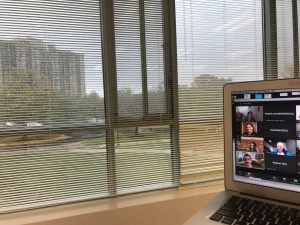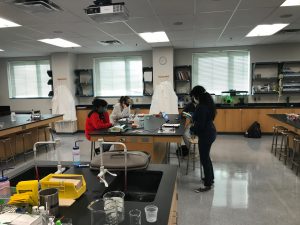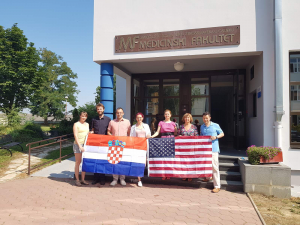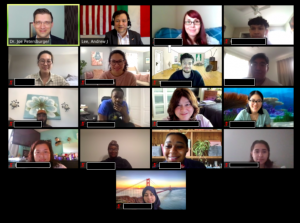Despite bad weather, Zoom meetings still continue!

And in person labs with limited numbers of students are bringing hands-on back to students! Mini-prep gels, always a favorite.

Despite bad weather, Zoom meetings still continue!

And in person labs with limited numbers of students are bringing hands-on back to students! Mini-prep gels, always a favorite.

Thanks to Prof. Joe Petersberger for his work to continue our international cooperation this summer! It was fantastic to meet with him and plan for post-COVID cooperation including our virtual guest lecturing appearances. Great to visit with an old friend and chart a course for future projects.

Thanks to Prof. Marija Heffer and colleagues at the University of Osijek (Croatia) Medical Faculty for the stimulating, engaging, and productive summer. Fruitful exchange of ideas, curriculum development, meetings with students, and casual chats about lab work provided a fruitful way to navigate the end of COVID-19. Hvala vam!


A big thanks goes out to Prof. Joe Petersburger from the University of Pécs (Hungary) Medical School for his guest lecture to General Introductory Biology courses during the recently concluded spring term. Prof. Petersburger generously joined us on a Saturday morning in late April for a far-ranging discussion on native insects to Hungarian lakes as well as the country’s response to COVID-19. We thank Prof. Petersburger for his commitment to international, trans-disciplinary learning and hope that COVID-19 has demonstrated that internet international exchange can become a part of our post-COVID-19 world. Thank you very much or Köszönöm szépen!
Congratulations to NVCC student Sabrina Melendez-Rosales who was selected from a national pool of applicants as one of 80 metro-DC scholars for participation in the Summer Health Professions Education Program sponsored by the Robert Wood Johnson Foundation. Sabrina will serve as a SHPEP scholar and take part in a pre-medical enrichment program involving academics, medical school application preparation, clinical shadowing, and networking opportunities from June 6 – July 16. SHPEP is regionally hosted by Howard University Hospital and Medical School. Congratulations to Sabrina on this important next step toward becoming a medical doctor! For further information and assistance applying for the summer 2022 program, have a look at the “Opportunities For Students” section of this webpage. Applications are usually due in early March for the summer session.

Zoom Info Session: Monday, Feb 1, 6pm EST
SHPEP is a free summer enrichment program focused on improving access to information and resources for college students interested in the health professions. SHPEP’s goal is to strengthen the academic proficiency and career development of students underrepresented in the health professions while preparing them for a successful matriculation to health professions schools.
During this session, attendees will hear directly from program sites, who are reviewing applications, to learn more about what they have to offer and how they will implement the program. You’ll also receive the perspective recent SHPEP scholars to give you their insights about the program.
As you may know, due to the COVID-19 pandemic, physical distancing guidelines, and the closure of some campuses, SHPEP will again be a 100% virtual experience in summer 2021. The pandemic necessitated virtual implementation of SHPEP in 2020, and we are proud that the program was successfully delivered online to more than 930 scholars last summer.
Zoom registration here:
https://zoom.us/webinar/register/WN_aw5JnFrjRCCCF1UX_Ze6WQ?utm_source=sfmc&utm_medium=&utm_campaign=&utm_content=

A Washington Post article “Screen Reading Can Wear on Your Attention” (January 2020) reinforces a commonly expressed idea that reading on printed paper improves reading comprehension when compared to reading on a screen. Especially during COVID, the push to the work online has intensified the time spent staring at glowing screens for prolonged periods of reading.
The Post article brings up additional problems with the push to digital:
•Unlike a printed book or article, digital content is often viewed as interchangeable and short-lived. There is less importance placed on treasuring a digital file (and valuing it as an important part of a published collection that is to be kept for many years). Instead, we’ll move on to the next webpage, digital download, or temporarily borrowed digital file. The digital content appears out of magic and equally easily disappears when a loan expires or the file is lost on a device in the midst of other files that don’t stick out. Having a pile of curated books, articles to read, or, gasp, magazine, that physically demand attention and aren’t invisibly tucked away in the innards of a computer may motivate the reader to attack the pile and not idly watch TV.
•Committing to read a digital book or webpage may not entail the same commitment as a physical product. The book or webpage is likely being viewed on a device that is connected to the internet, with a capable web browser, or app, that is an open invitation to distracted reading. Your facebook feed is only a click away, a sports highlight is also at the fingertips, as well as every movie ever made. Do you really want to read that Biology textbook on evolution and fossils when you can watch the new release on Netflix by tapping the screen three times?
It may also be nearly irresistible to avoid that targeted ads that follow you when you are attempting to read a relevant webpage related to your studies. Wow, Amazon reminded me that I didn’t buy that pair of shoes.
University research by European and Middle-Eastern scholars show that dense information (typically found in science texts) is more difficult to read on a screen than breezy narratives (the backbone of English lit or history classes). So perhaps reading that science textbook or printing out PDFs will improve comprehension and retention of material?
Worth considering how you read, as much as what you read!

Harvard University is offering 70 of its online classes for free (liberal arts, science, computer science). Though you won’t earn credits or receive a diploma/certificate, you can use your time to: prepare for a future class, investigate an area of interest, and stay focused on your education. Of particular note in Harvard’s online offerings: their high production values and effective use of videos with the professor and text/image overlays.
For more information, visit:
https://online-learning.harvard.edu/catalog/free
To be certain that low income students can access high-bandwidth internet, Comcast is offering 60 days of free internet. Low ~$10/month price after that, with no contract. Expect 1 week shipping time and evidence of low-income status is required.
Also, college will keep one open computer lab on each campus open with regular deep cleanings.
Check out the website below for additional details:
https://www.internetessentials.com/
